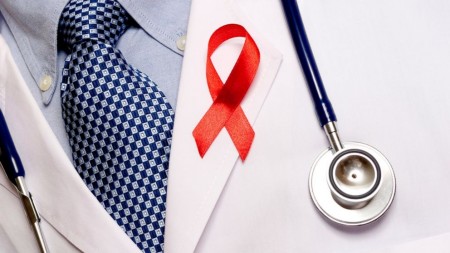One of the most feared diseases in the world is now, for British doctors, a manageable chronic condition. It’s a triumph we’re oddly scared to talk about
‘There is now a deadly virus, which anyone can catch from sex with an infected person. If we’re not careful, the people who’ve died so far, will be just the tip of the iceberg… If you ignore AIDS, it could be the death of you.’
It has been hailed as one of the most memorable health campaigns ever created. The message couldn’t have been clearer and people were petrified. For anyone over the age of 30, the ‘Iceberg’ and ‘Tombstone’ adverts — as they came to be known — with John Hurt’s menacing voice-over, still bring back a sense of crushing dread. The UK actually led the way with its HIV public health campaigns; it was considered so successful in raising awareness that other countries adopted similar adverts relying on shock and fear. The thing I am most struck by now, however, is how over-the-top they seem.
It’s now 30 years since HIV was discovered. During my training as a doctor in central London in the late 1990s, people were still dying of AIDS. But since then, incredible pharmacological advances have been made in how the virus is treated and managed. Combination medications — termed ‘highly active antiretroviral therapy’ or Haart — have resulted in being able to maintain the infected person’s immune system and therefore prevent the opportunistic infections that resulted in the development of AIDS and led to death. Despite working in the centre of London with high-risk groups such as sex workers and drug addicts, I haven’t seen someone die of HIV for years. It’s now incredibly rare to die as a result of HIV/AIDS in this country. The most recent statistics show that in 2012, less than 1 per cent of people with HIV died. This is about the same for the non-infected population. It’s hard, now, to argue that HIV is a death sentence.
Those who are dangerously unwell with the disease are often immigrants who have been infected for years, and present to hospital late with the kind of infections that we no longer see in those on medication. One study suggested that around 75 per cent of HIV-related inpatient admissions are immigrants, with about 60 per cent from Africa. For the vast majority of people with HIV in this country, though, the disease is managed entirely in outpatient clinics. HIV/AIDS wards and specialist units have closed simply because there is no longer the volume of patients to fill them. This is a hugely encouraging fact, which would have seemed impossible to those who stood, in the 1980s and 1990s, as friends, family and loved ones faded away while doctors stood by utterly helpless. What is truly startling is the speed with which medicine responded to HIV.
Read More about HIV vs Diabetes…






[…] It’s now 30 years since HIV was discovered. During my training as a doctor in central London in the late 1990s, people were still dying of AIDS. But …read more […]
[…] As a doctor, I’d rather have HIV than diabetes […]